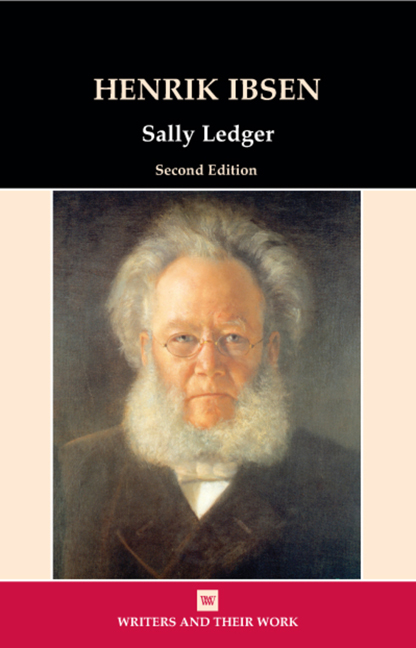Book contents
- Frontmatter
- Dedication
- Contents
- Acknowledgements
- Biographical Outline
- Note on Translations
- Abbreviations
- 1 Ibsenism and A Doll's House
- 2 Ibsen, Realism and ‘Modern’ Drama: From Norwegian Nationalism to Ghosts
- 3 Liberalism and its Discontents: Ibsen's Politics in An Enemy of the People
- 4 Ibsen's Women: The Lady from the Sea, Hedda Gabler and Little Eyolf
- 5 Ibsen, Freud and Psychological Drama: Rosmersholm and Peer Gynt
- 6 Beyond Realism: John Gabriel Borkman and When We Dead Awaken
- 7 Afterword: Ibsen Now
- Notes
- Select Bibliography
- Index
- Recent and Forthcoming Titles in the New Series of WRITERS AND THEIR WORK
2 - Ibsen, Realism and ‘Modern’ Drama: From Norwegian Nationalism to Ghosts
- Frontmatter
- Dedication
- Contents
- Acknowledgements
- Biographical Outline
- Note on Translations
- Abbreviations
- 1 Ibsenism and A Doll's House
- 2 Ibsen, Realism and ‘Modern’ Drama: From Norwegian Nationalism to Ghosts
- 3 Liberalism and its Discontents: Ibsen's Politics in An Enemy of the People
- 4 Ibsen's Women: The Lady from the Sea, Hedda Gabler and Little Eyolf
- 5 Ibsen, Freud and Psychological Drama: Rosmersholm and Peer Gynt
- 6 Beyond Realism: John Gabriel Borkman and When We Dead Awaken
- 7 Afterword: Ibsen Now
- Notes
- Select Bibliography
- Index
- Recent and Forthcoming Titles in the New Series of WRITERS AND THEIR WORK
Summary
That Henrik Ibsen should have become one of the giants of modern European drama is little short of astonishing. Born in a small Norwegian town, Skien, before the start of Queen Victoria's reign, Ibsen, the son of a merchant fallen on hard times, had a relatively thin literary tradition on which to draw. The national literature of nineteenth-century Norway was quite slender, the only writer with a ‘high-cultural’ reputation – Ludvig Holberg (1684–1754) – being long dead. Norway's main literary project when Ibsen was a young man was a nationalistic reclamation of old Norwegian ballads and folktales. It was Ibsen's involvement with this project which would delay his reinvention of European drama.
On his arrival in Christiania (now Oslo) in 1850 as a 22-yearold student, Ibsen quickly got to know the young Björnstjerne Björnson, who would become both a friend and a rival. For both men, the mid-century proved to be an uninspiring time for would-be playwrights. In 1851 Ibsen took up the post of ‘dramatic author’ at the Bergen Theatre, where he was to spend six years of poverty and artistic depression. He assisted in the production of many popular mid-century plays, but there was (for example) no classical drama, no Shakespeare, and no Molière; nothing, in short, that Ibsen could learn anything new from. High tragedy, comedy, farce and melodrama dominated the Bergen Theatre in the 1850s, and such a dramatic diet was common across much of Europe at this time. ‘Serious’ drama was never written in prose, and it was always concerned with people of high estate. The idea that a tragedy could be written in prose, or that it could be about ordinary nineteenth-century people, was unheard of. Any such play would not have been considered ‘art’ by either actors or audience. The theatrical status quo which reigned in the mid-century European theatre would, eventually, be radically dismantled by Ibsen; but this was many years in the future.
Ibsen's first few plays had historical settings and drew on well-worn dramatic traditions. Of his early work, Catiline (1849) is a tragedy set in ancient Rome, and is written in rhymed verse.
- Type
- Chapter
- Information
- Henrik Ibsen , pp. 15 - 25Publisher: Liverpool University PressPrint publication year: 2008



